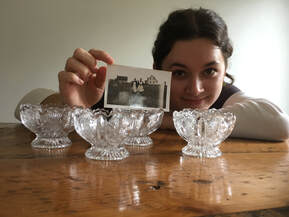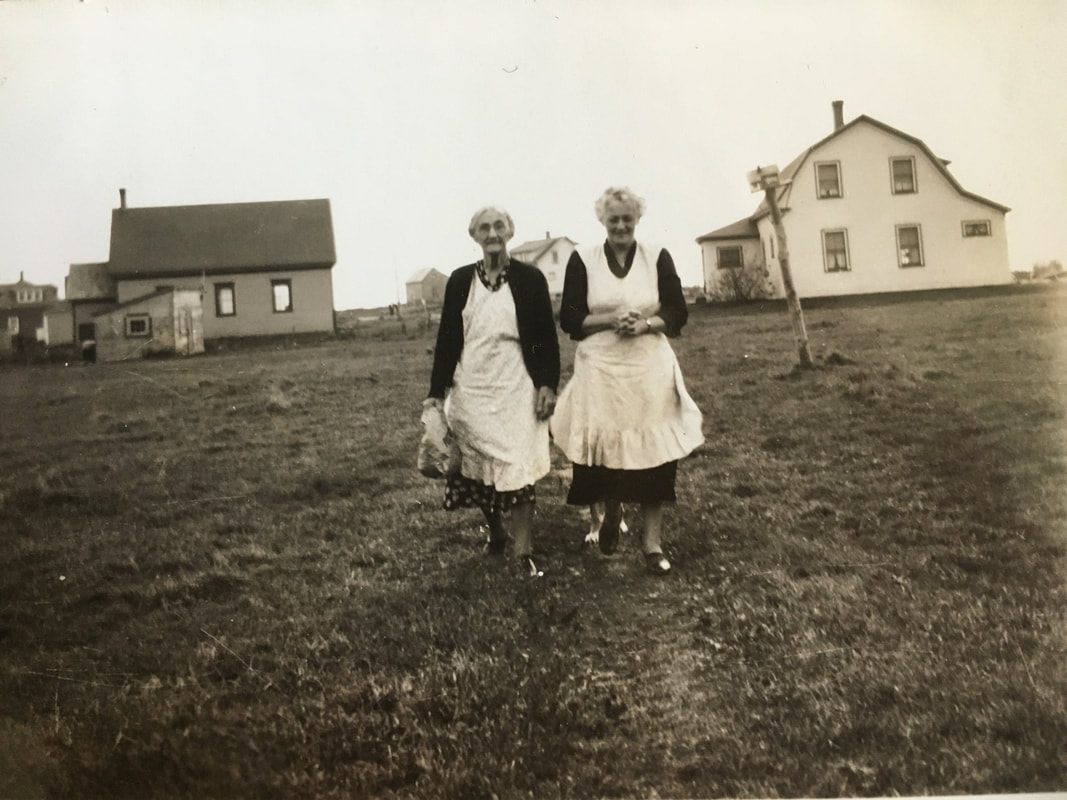 My daughter Amélie with her great, great grandmère's dishes. She's also holding a picture of Philomène with her daughter Lisette, which is Amélie's middle name. My daughter Amélie with her great, great grandmère's dishes. She's also holding a picture of Philomène with her daughter Lisette, which is Amélie's middle name. I have some dishes that belonged to my great grandmère DeViller, my mother's mother, Anne Philomène Surette. I don’t know what she used the dishes for. I only know that my mom had them for as long as I can remember. Philomène, as she was known, lived her whole life in Pinkney's Point, Nova Scotia, a fishing village in a flat, massive network of salt marshes near Yarmouth. She lived in the house that had been in her family since 1858. By the time Philomène was born in 1867, the house was already 100 years old. Philomène, married Norman DeViller and had 12 children with him. Ten lived to adulthood, including my grandmère, Linda Lucy DeViller. Philomène was the village postmistress for 51 years, sorting and handing over the mail to the people of Pinkney's Point from her dining room. When my mom talks of Philomène, she always says “I don't think she was very happy”. She speculates that Philomène didn’t love Norman. Norman, it turns out, was not her first husband. I do not know what year Philomène and Norman married, but we do know their first child, (also Norman), was born in 1894. Just six years prior, in 1888, Philomène married her first husband Étienne Thibodeau. He was a fisherman from Salmon River, about 50 kilometres away from Pinkney’s Point. I know from Grandmère that Étienne died at sea in the first year of their marriage, presumably drowned. I should say that when Grandmère told me this, she used ‘Étienne’ (French for ‘Stephen’), but in his marriage record he is listed as Stephen. I never asked Grandmère how she knew this, but now I wonder if Philomène had told her directly or if it was village gossip that Philomène’s children all eventually came to know. When Philomène married Norman, he moved into the Surette family home where they raised their family. I can only guess that Étienne had previously done the same thing before his untimely passing. I can’t help but imagine Philomène standing on the cliff near the house, overlooking the Atlantic, watching for Étienne to return, even years later when she had one of Norman’s babies on her hip. I see her standing there staring out at the sea that swallowed her true love. It’s possible. I’ll never know, but this is where my mind goes. "The man is the boss of the barn and the woman is the boss of the house". This solid gold nugget was relayed to me by Grandmère. Her father used to say this. How annoying would that be to hear if you were Philomène? Maybe that statement didn’t sit well with her, or maybe it didn’t bother her at all. Maybe she pined for Étienne until the end of her days. Maybe not. I do know she ran a clean house, so maybe she revelled in the ‘boss of the house’ designation. My mom remembers there was always a fire in the wood stove in the kitchen, clean sheets on the beds, delicious food and fresh cream from the cow. That house, now 255 years old, still sits in Pinkney's Point but it's not in our family anymore. Philomène died in 1958 at 90 years old. After her death her adult children Mildred and Elie lived in the house. Tante Mildred gave my mom the dishes I have now. The story is that Philomène bought them for 10 cents each from the little store she ran along with the post office. Mom used the little glass dishes at every Christmas dinner with us to serve carrot pudding. This was not an old family recipe but one that Mom pulled out of her beloved Purity cookbook. This dessert was made palatable to us kids only by the boozy ‘hard sauce’ that went with it and was really just butter frosting laced with rum. There are only five of the dishes left. I won’t say who broke the sixth one, but it wasn’t me. The glass of each dish is thick and has a thistle design engraved in it. At the Pinkney’s Point house, the dishes were kept in a little built-in cabinet in the sitting room. I remember the room well, visiting with Mildred and Elie there and clambering down to the rocky beach by the house, slippery with seaweed, with my little brothers when we were let outside. Philomène is long gone and I never knew her, but maybe she has left me something besides the dishes. Maybe it's some of her longing I feel when I look out at the sea, searching the horizon, not for Étienne, but for something. Some kind of longing or belonging that used to be and is no more except in the ones she left behind.
0 Comments
Your comment will be posted after it is approved.
Leave a Reply. |
Archives
May 2022
|

 RSS Feed
RSS Feed